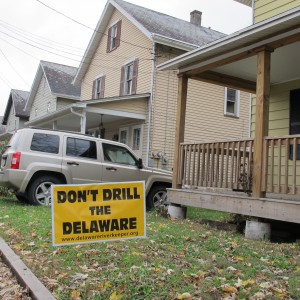What New York’s fracking ban means for drilling along the Delaware river
-
Susan Phillips

Susan Phillips / StateImpact Pennsylvania
A drilling protest sign sits on the lawn of a home along the Delaware River.
The surprise decision by New York Governor Andrew Cuomo to ban fracking and prevent the development of Marcellus Shale gas in that state could have ripple effects in eastern Pennsylvania. New York issued a lengthy scientific report on potential health and environmental impacts Wednesday. And Cuomo’s subsequent decision could mean a permanent ban on drilling in the eastern part of Pennsylvania, where the Delaware River Basin Commission has authority to regulate shale gas drilling.
The current de facto moratorium on drilling for gas along the Delaware river in both New York and Pennsylvania exists because the four states and a federal representative who comprise the Delaware River Basin Commission could not agree on how to do it. In 2010 the DRBC instructed staff members to propose new regulations. After receiving thousands of comments, the DRBC revised its proposals and scheduled a vote in the fall of 2011. But the lack of consensus among the commissioners prompted them to cancel the meeting, and they have not taken up the issue in a public forum since. At the time, Pennsylvania’s Governor Tom Corbett was the strongest advocate for drilling. Delaware’s governor opposed it. New Jersey and the Obama Administration kept silent. And New York was on the fence.
But this week’s decision by Governor Cuomo has taken New York off the fence. And when combined with the promise by Pennsylvania Governor-elect Tom Wolf not to open the Delaware watershed to drilling, New York’s decision to ban fracking altogether changes the picture. This is good news to activists like Maya van Rossum, from the Delaware Riverkeeper. Van Rossum has been fighting to keep gas rigs out of eastern Pennsylvania since 2008. She says New York’s health and environmental study, along with Cuomo’s subsequent decision, means her work has paid off.
“It was an arms-length process really designed to secure a fair and earnest scientific analysis,” said van Rossum. “It was not a political process, which is what you had in Pennsylvania, a political process that tries to use faux-science as a shield for bad decision-making.”
The 184-page report by the New York health commissioner documents a number of health and environmental risks, and concludes that too many gaps in the science remain.
Van Rossum says she wants the DRBC to permanently ban drilling in the Delaware watershed.
“I’m certainly feeling very very positive that the ban could become permanent,” said van Rossum. “It’s my expectiation that the New York decision will embolden [Governor-elect] Wolf to do the right thing and protect our watershed, but there’s always the possibility that the politics will play out differently.”
Although Wolf made the campaign promise to maintain the moratorium in the Delaware watershed, he has criticized New York’s decision and says he doesn’t agree that gaps in the science exist. And it’s unclear how the DRBC will react. The commission could simply maintain the status quo.
The DRBC’s former executive director Carol Collier says she hopes the report and New York’s decision will embolden the commissioners to end the stalemate.
“I think this decision by New York gives strength to the Commission to move forward,” said Collier. “It’s been in purgatory for so long it would be nice to have a decision so everyone knew what the situation was in the Delaware basin.”
Collier now Like von Rossum, Collier says the decision was based on a thorough review of current research.
“They have done a lot of good science and bench marking both in their environmental assessment and health assessment,” she said. And she says she hopes this will influence the incoming Wolf Administration.
“I see a more learned approach to drilling,” said Collier. “Looking at what science is needed, the need for more planning, should all landscapes be treated equally. Are there some areas where drilling should be banned or held to higher standards? It gives me hope that even if drilling [continues] in other parts of Pennsylvania that it will be done in a more thoughtful way. And I think that’s something that’s been sorely lacking.”
While the moratorium has been in place, DRBC staffers have been gathering baseline water quality data in preparation for future drilling. But it’s unclear how the Commissioners will act. And it’s still unclear what New Jersey Governor Chris Christie or the President will decide. But come January, it appears that a majority of states, Pennsylvania, New York, and Delaware will come out in support of a continued moratorium. The commissioners could maintain the status quo and simply not act, or they could schedule a vote, or even revise the proposed regulations once again. The next public meeting will take place sometime in March.
















